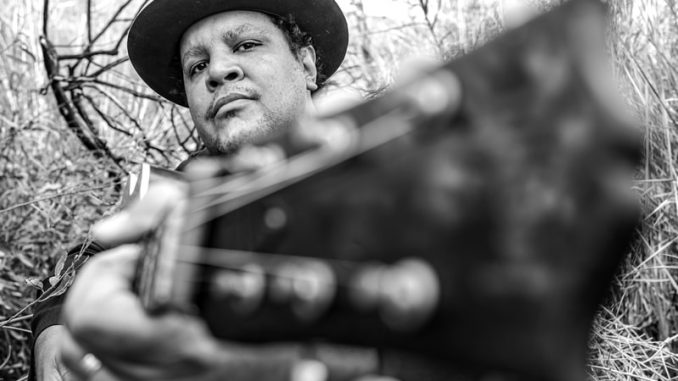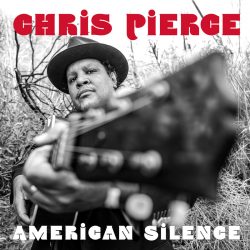
Passionate, well-constructed, generously-spirited protest music that can’t be ignored.
 There’s a quote attributed to Americana/folk musician Todd Snider out there where he says ‘I didn’t write this song to change people’s minds, I wrote it to ease my own.’ But in the case of the formidable protest album ‘American Silence’ by Los Angeles musician Chris Pierce, it feels like Pierce is trying to do both these things simultaneously. Handling topics as depressingly relevant as homelessness, racism and mass incarceration, as ‘American Silence’ does, hardly makes for comfortable listening. But for his ninth album and armed with the classic folk protest singer’s weapons of an acoustic guitar, harmonica and, above all, a powerful voice that in Pierce’s case owes a lot to his blues and soul background, Pierce succeeds in the biggest challenge for almost anybody trying to deliver an avowedly political message through music.
There’s a quote attributed to Americana/folk musician Todd Snider out there where he says ‘I didn’t write this song to change people’s minds, I wrote it to ease my own.’ But in the case of the formidable protest album ‘American Silence’ by Los Angeles musician Chris Pierce, it feels like Pierce is trying to do both these things simultaneously. Handling topics as depressingly relevant as homelessness, racism and mass incarceration, as ‘American Silence’ does, hardly makes for comfortable listening. But for his ninth album and armed with the classic folk protest singer’s weapons of an acoustic guitar, harmonica and, above all, a powerful voice that in Pierce’s case owes a lot to his blues and soul background, Pierce succeeds in the biggest challenge for almost anybody trying to deliver an avowedly political message through music.
You could argue part of that challenge consists of making a listener want to go on listening because of the music itself, which with simple but effective folk melodies is certainly the case for ‘American Silence’. But the other part of the equation, which again works faultlessly on ‘American Silence’, is that the lyrics are powerful and convincing enough for the listener to make hearing them out, and acting on them, feel like an ethical necessity. Or as Pierce himself sings on ‘Ring Them Bells’:
“Ain’t no drill, it’s time, sound all the bells. Shame it, face it, damn it to hell.”
Why ‘American Silence’ is so inspiring is partly because its lyrics effortlessly entwine some dramatic personal elements of racism, like Pierce watching a cross burn on his parents front lawn when he was aged five or his violent experiences with the police when a grown man, with the broader American-wide context of oppression and/or injustice. As the title song puts it, “American silence is a crime.”
There is a subtler side to that process too, such as on ‘Ring Them Bells’, when Pierce plays down those personal experiences by saying that he’s only a part of a much bigger, and far worse, picture. But that, of course, automatically begs the question of how bad that bigger picture could be:
“I’ve got too many stories where these come from, and mine ain’t so bad when you think about some. Too many didn’t make it to ever sing another song.” But rather than a simple lamentation, he concludes, “Let their spirits be the wind to help us right the wrong.”
Quite apart from successfully mining his personal experiences for the album, including a very moving tribute to his father on ‘Bring The Old Man Home’, Pierce skilfully weaves in elements of America’s political history, like in ‘The Bridge of John’, inspired by leader John Lewis, who led the march across the Edmund Pettus Bridge in Selma, Alabama in 1965, a landmark moment in the US Civil Rights movement. Or in ‘It’s Been Burning For A While’, through words – and images stretching back for generations on the harrowing video that goes with it – Pierce points out that while all these stories have been making the headlines a lot recently, repression of marginalized USA communities of all kinds is nothing new. The bleak, powerful history recounted in ‘Residential School’, the government-run boarding schools where Native American children were ‘re-educated’, makes that perfectly and painfully. clear.
To sum up, why ‘American Silence’ hits home so effectively because it isn’t the kind of protest album that simply bewails the lot of the oppressed and leaves it at that. Quite apart from underling the dignity and anger of those who suffer, not to mention frustration – “I don’t want ever to sing this song again”, he says at one point in ‘How Can Anybody Be Ok With This’ – ‘American Silence’ makes a point of asking the listener what part they can play in improving matters. Or as Pierce himself says ‘It is written as a call, in the enduring hope of a response.’


